Talent Management and Motivation in the UK Retail Industry: A Study
VerifiedAdded on 2023/06/14
|11
|2947
|329
Project
AI Summary
This research project investigates the role of motivation in talent management and retention within the UK retail industry, focusing on a case study of Argos. The study aims to understand the concept of talent management, identify the role of motivation in managing and retaining talented employees, and determine the benefits of talent management and retention for Argos. The research employs a deductive approach with a positivism philosophy, utilizing survey and systematic literature review strategies. Quantitative research choice is adopted for data collection through questionnaires, supplemented by secondary data from articles, journals, and books. The study follows ethical considerations such as obtaining consent, ensuring confidentiality, and maintaining anonymity. The project outlines a timeline for various activities, including literature review, data collection, analysis, and report writing, with defined milestones and a Gantt chart for project management. The findings are expected to highlight the significance of talent management practices in motivating and retaining employees, ultimately contributing to the competitive advantage of organizations in the retail sector.
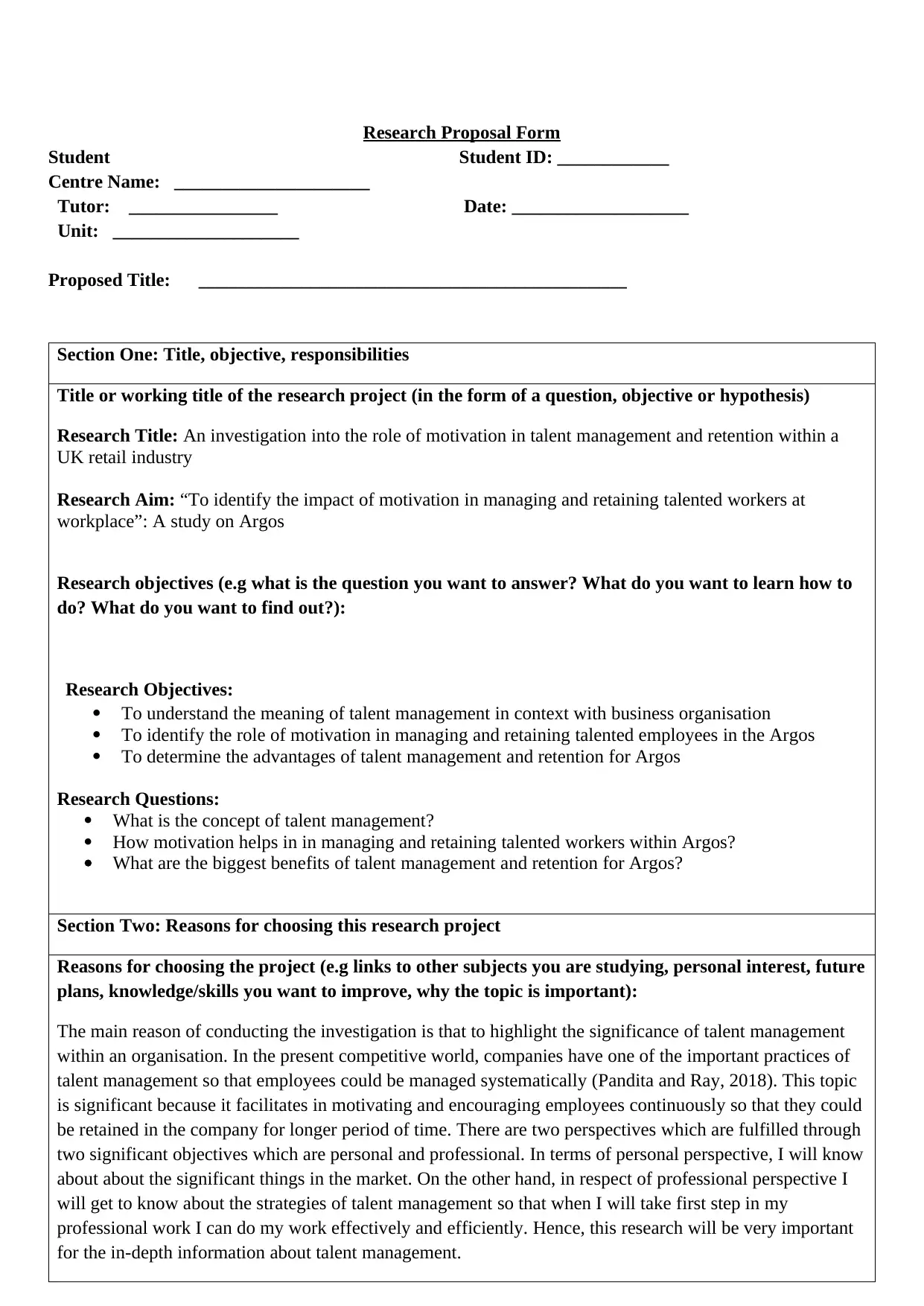
Research Proposal Form
Student Student ID: ____________
Centre Name: _____________________
Tutor: ________________ Date: ___________________
Unit: ____________________
Proposed Title: ______________________________________________
Section One: Title, objective, responsibilities
Title or working title of the research project (in the form of a question, objective or hypothesis)
Research Title: An investigation into the role of motivation in talent management and retention within a
UK retail industry
Research Aim: “To identify the impact of motivation in managing and retaining talented workers at
workplace”: A study on Argos
Research objectives (e.g what is the question you want to answer? What do you want to learn how to
do? What do you want to find out?):
Research Objectives:
To understand the meaning of talent management in context with business organisation
To identify the role of motivation in managing and retaining talented employees in the Argos
To determine the advantages of talent management and retention for Argos
Research Questions:
What is the concept of talent management?
How motivation helps in in managing and retaining talented workers within Argos?
What are the biggest benefits of talent management and retention for Argos?
Section Two: Reasons for choosing this research project
Reasons for choosing the project (e.g links to other subjects you are studying, personal interest, future
plans, knowledge/skills you want to improve, why the topic is important):
The main reason of conducting the investigation is that to highlight the significance of talent management
within an organisation. In the present competitive world, companies have one of the important practices of
talent management so that employees could be managed systematically (Pandita and Ray, 2018). This topic
is significant because it facilitates in motivating and encouraging employees continuously so that they could
be retained in the company for longer period of time. There are two perspectives which are fulfilled through
two significant objectives which are personal and professional. In terms of personal perspective, I will know
about about the significant things in the market. On the other hand, in respect of professional perspective I
will get to know about the strategies of talent management so that when I will take first step in my
professional work I can do my work effectively and efficiently. Hence, this research will be very important
for the in-depth information about talent management.
Student Student ID: ____________
Centre Name: _____________________
Tutor: ________________ Date: ___________________
Unit: ____________________
Proposed Title: ______________________________________________
Section One: Title, objective, responsibilities
Title or working title of the research project (in the form of a question, objective or hypothesis)
Research Title: An investigation into the role of motivation in talent management and retention within a
UK retail industry
Research Aim: “To identify the impact of motivation in managing and retaining talented workers at
workplace”: A study on Argos
Research objectives (e.g what is the question you want to answer? What do you want to learn how to
do? What do you want to find out?):
Research Objectives:
To understand the meaning of talent management in context with business organisation
To identify the role of motivation in managing and retaining talented employees in the Argos
To determine the advantages of talent management and retention for Argos
Research Questions:
What is the concept of talent management?
How motivation helps in in managing and retaining talented workers within Argos?
What are the biggest benefits of talent management and retention for Argos?
Section Two: Reasons for choosing this research project
Reasons for choosing the project (e.g links to other subjects you are studying, personal interest, future
plans, knowledge/skills you want to improve, why the topic is important):
The main reason of conducting the investigation is that to highlight the significance of talent management
within an organisation. In the present competitive world, companies have one of the important practices of
talent management so that employees could be managed systematically (Pandita and Ray, 2018). This topic
is significant because it facilitates in motivating and encouraging employees continuously so that they could
be retained in the company for longer period of time. There are two perspectives which are fulfilled through
two significant objectives which are personal and professional. In terms of personal perspective, I will know
about about the significant things in the market. On the other hand, in respect of professional perspective I
will get to know about the strategies of talent management so that when I will take first step in my
professional work I can do my work effectively and efficiently. Hence, this research will be very important
for the in-depth information about talent management.
Paraphrase This Document
Need a fresh take? Get an instant paraphrase of this document with our AI Paraphraser
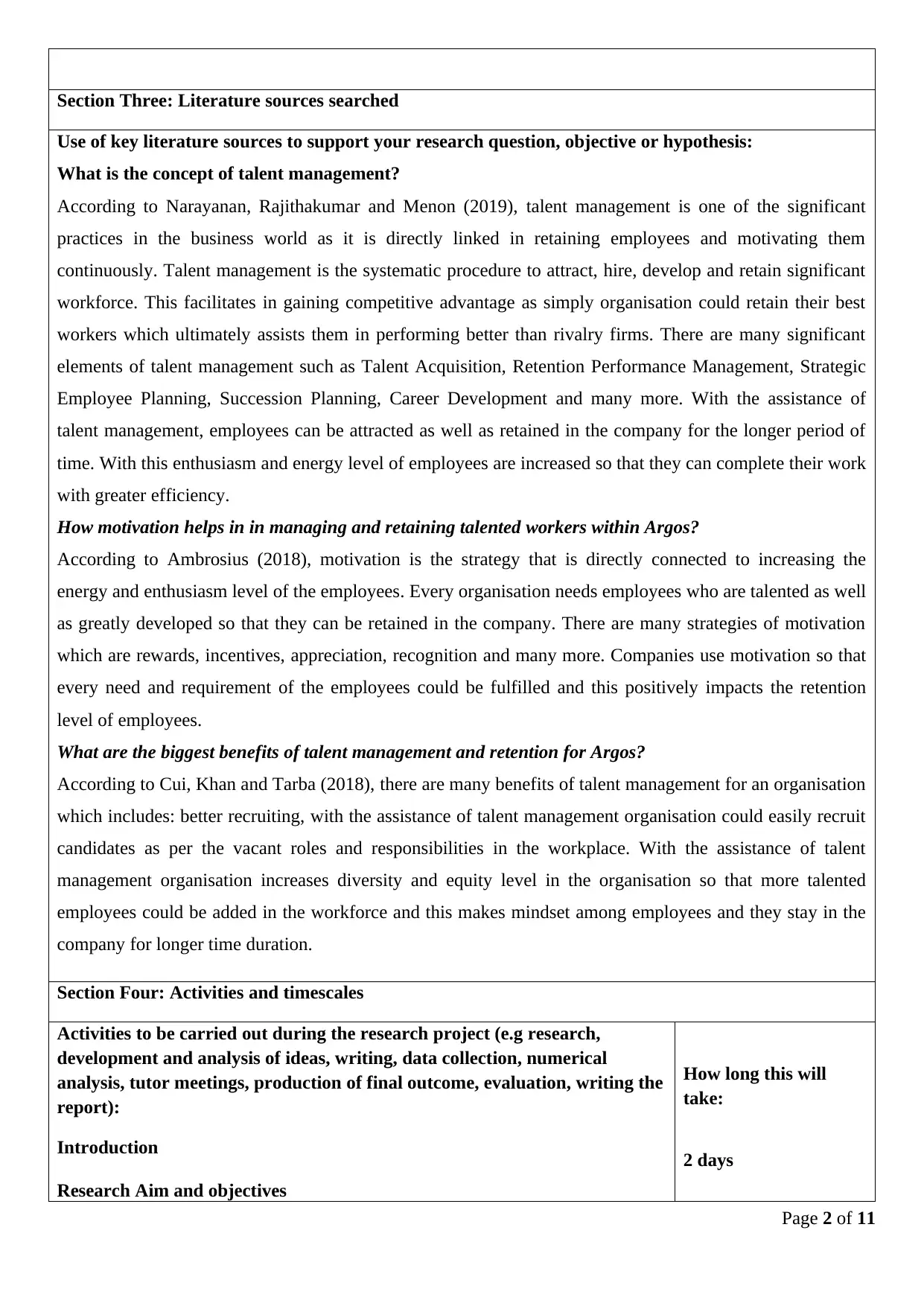
Section Three: Literature sources searched
Use of key literature sources to support your research question, objective or hypothesis:
What is the concept of talent management?
According to Narayanan, Rajithakumar and Menon (2019), talent management is one of the significant
practices in the business world as it is directly linked in retaining employees and motivating them
continuously. Talent management is the systematic procedure to attract, hire, develop and retain significant
workforce. This facilitates in gaining competitive advantage as simply organisation could retain their best
workers which ultimately assists them in performing better than rivalry firms. There are many significant
elements of talent management such as Talent Acquisition, Retention Performance Management, Strategic
Employee Planning, Succession Planning, Career Development and many more. With the assistance of
talent management, employees can be attracted as well as retained in the company for the longer period of
time. With this enthusiasm and energy level of employees are increased so that they can complete their work
with greater efficiency.
How motivation helps in in managing and retaining talented workers within Argos?
According to Ambrosius (2018), motivation is the strategy that is directly connected to increasing the
energy and enthusiasm level of the employees. Every organisation needs employees who are talented as well
as greatly developed so that they can be retained in the company. There are many strategies of motivation
which are rewards, incentives, appreciation, recognition and many more. Companies use motivation so that
every need and requirement of the employees could be fulfilled and this positively impacts the retention
level of employees.
What are the biggest benefits of talent management and retention for Argos?
According to Cui, Khan and Tarba (2018), there are many benefits of talent management for an organisation
which includes: better recruiting, with the assistance of talent management organisation could easily recruit
candidates as per the vacant roles and responsibilities in the workplace. With the assistance of talent
management organisation increases diversity and equity level in the organisation so that more talented
employees could be added in the workforce and this makes mindset among employees and they stay in the
company for longer time duration.
Section Four: Activities and timescales
Activities to be carried out during the research project (e.g research,
development and analysis of ideas, writing, data collection, numerical
analysis, tutor meetings, production of final outcome, evaluation, writing the
report):
Introduction
Research Aim and objectives
How long this will
take:
2 days
Page 2 of 11
Use of key literature sources to support your research question, objective or hypothesis:
What is the concept of talent management?
According to Narayanan, Rajithakumar and Menon (2019), talent management is one of the significant
practices in the business world as it is directly linked in retaining employees and motivating them
continuously. Talent management is the systematic procedure to attract, hire, develop and retain significant
workforce. This facilitates in gaining competitive advantage as simply organisation could retain their best
workers which ultimately assists them in performing better than rivalry firms. There are many significant
elements of talent management such as Talent Acquisition, Retention Performance Management, Strategic
Employee Planning, Succession Planning, Career Development and many more. With the assistance of
talent management, employees can be attracted as well as retained in the company for the longer period of
time. With this enthusiasm and energy level of employees are increased so that they can complete their work
with greater efficiency.
How motivation helps in in managing and retaining talented workers within Argos?
According to Ambrosius (2018), motivation is the strategy that is directly connected to increasing the
energy and enthusiasm level of the employees. Every organisation needs employees who are talented as well
as greatly developed so that they can be retained in the company. There are many strategies of motivation
which are rewards, incentives, appreciation, recognition and many more. Companies use motivation so that
every need and requirement of the employees could be fulfilled and this positively impacts the retention
level of employees.
What are the biggest benefits of talent management and retention for Argos?
According to Cui, Khan and Tarba (2018), there are many benefits of talent management for an organisation
which includes: better recruiting, with the assistance of talent management organisation could easily recruit
candidates as per the vacant roles and responsibilities in the workplace. With the assistance of talent
management organisation increases diversity and equity level in the organisation so that more talented
employees could be added in the workforce and this makes mindset among employees and they stay in the
company for longer time duration.
Section Four: Activities and timescales
Activities to be carried out during the research project (e.g research,
development and analysis of ideas, writing, data collection, numerical
analysis, tutor meetings, production of final outcome, evaluation, writing the
report):
Introduction
Research Aim and objectives
How long this will
take:
2 days
Page 2 of 11
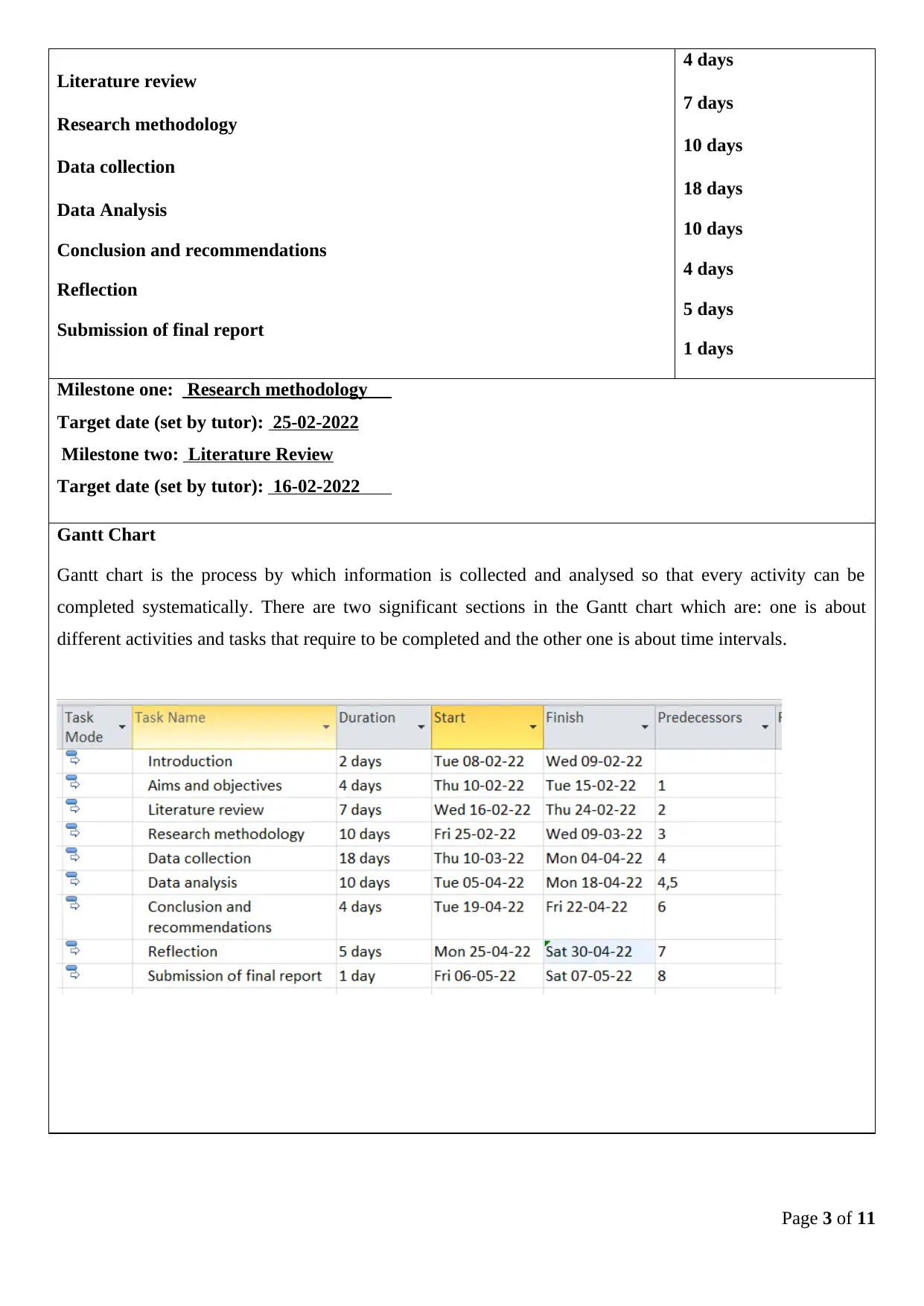
Literature review
Research methodology
Data collection
Data Analysis
Conclusion and recommendations
Reflection
Submission of final report
4 days
7 days
10 days
18 days
10 days
4 days
5 days
1 days
Milestone one: Research methodology
Target date (set by tutor): 25-02-2022
Milestone two: Literature Review
Target date (set by tutor): 16-02-2022
Gantt Chart
Gantt chart is the process by which information is collected and analysed so that every activity can be
completed systematically. There are two significant sections in the Gantt chart which are: one is about
different activities and tasks that require to be completed and the other one is about time intervals.
Page 3 of 11
Research methodology
Data collection
Data Analysis
Conclusion and recommendations
Reflection
Submission of final report
4 days
7 days
10 days
18 days
10 days
4 days
5 days
1 days
Milestone one: Research methodology
Target date (set by tutor): 25-02-2022
Milestone two: Literature Review
Target date (set by tutor): 16-02-2022
Gantt Chart
Gantt chart is the process by which information is collected and analysed so that every activity can be
completed systematically. There are two significant sections in the Gantt chart which are: one is about
different activities and tasks that require to be completed and the other one is about time intervals.
Page 3 of 11
⊘ This is a preview!⊘
Do you want full access?
Subscribe today to unlock all pages.

Trusted by 1+ million students worldwide
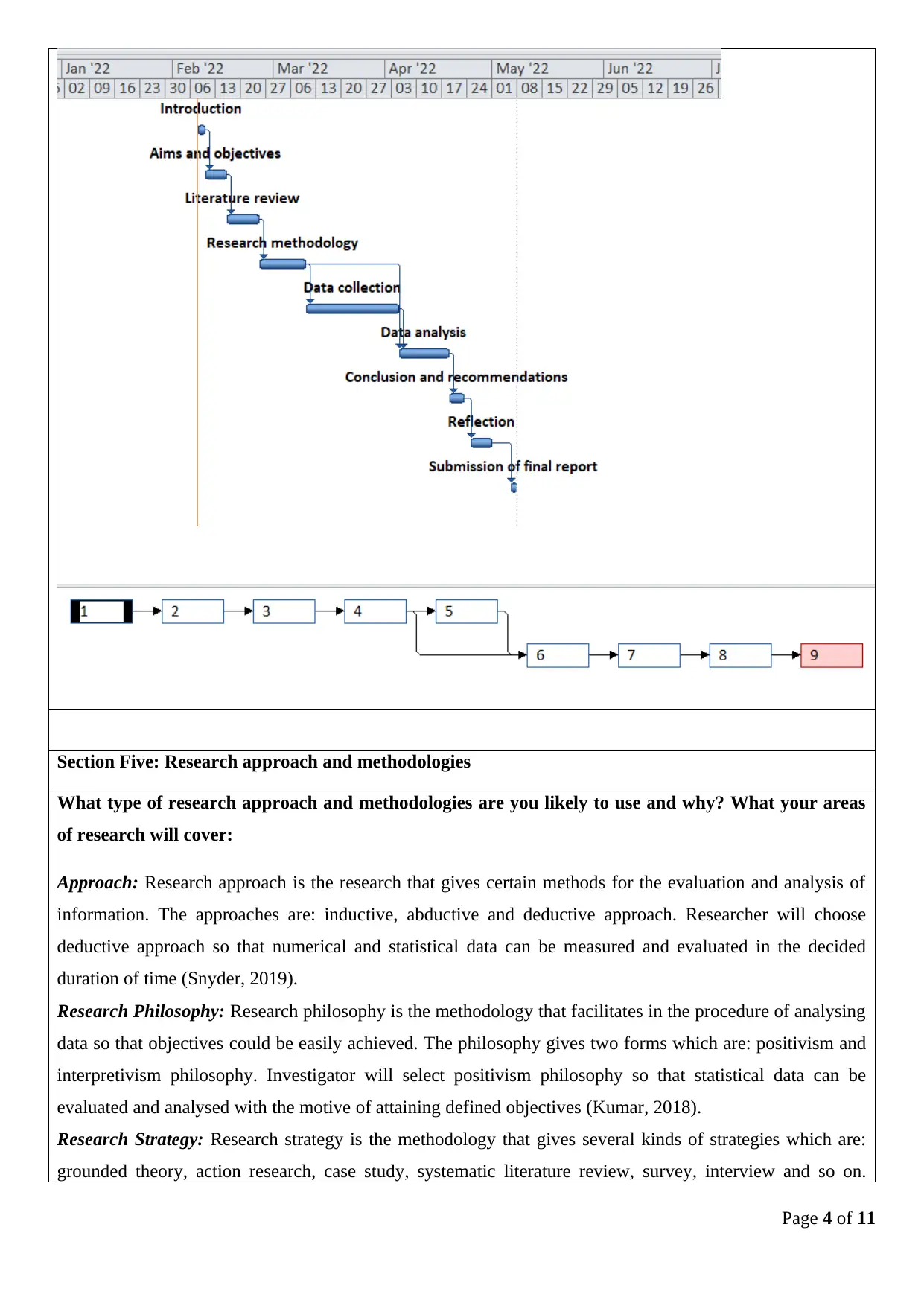
Section Five: Research approach and methodologies
What type of research approach and methodologies are you likely to use and why? What your areas
of research will cover:
Approach: Research approach is the research that gives certain methods for the evaluation and analysis of
information. The approaches are: inductive, abductive and deductive approach. Researcher will choose
deductive approach so that numerical and statistical data can be measured and evaluated in the decided
duration of time (Snyder, 2019).
Research Philosophy: Research philosophy is the methodology that facilitates in the procedure of analysing
data so that objectives could be easily achieved. The philosophy gives two forms which are: positivism and
interpretivism philosophy. Investigator will select positivism philosophy so that statistical data can be
evaluated and analysed with the motive of attaining defined objectives (Kumar, 2018).
Research Strategy: Research strategy is the methodology that gives several kinds of strategies which are:
grounded theory, action research, case study, systematic literature review, survey, interview and so on.
Page 4 of 11
What type of research approach and methodologies are you likely to use and why? What your areas
of research will cover:
Approach: Research approach is the research that gives certain methods for the evaluation and analysis of
information. The approaches are: inductive, abductive and deductive approach. Researcher will choose
deductive approach so that numerical and statistical data can be measured and evaluated in the decided
duration of time (Snyder, 2019).
Research Philosophy: Research philosophy is the methodology that facilitates in the procedure of analysing
data so that objectives could be easily achieved. The philosophy gives two forms which are: positivism and
interpretivism philosophy. Investigator will select positivism philosophy so that statistical data can be
evaluated and analysed with the motive of attaining defined objectives (Kumar, 2018).
Research Strategy: Research strategy is the methodology that gives several kinds of strategies which are:
grounded theory, action research, case study, systematic literature review, survey, interview and so on.
Page 4 of 11
Paraphrase This Document
Need a fresh take? Get an instant paraphrase of this document with our AI Paraphraser
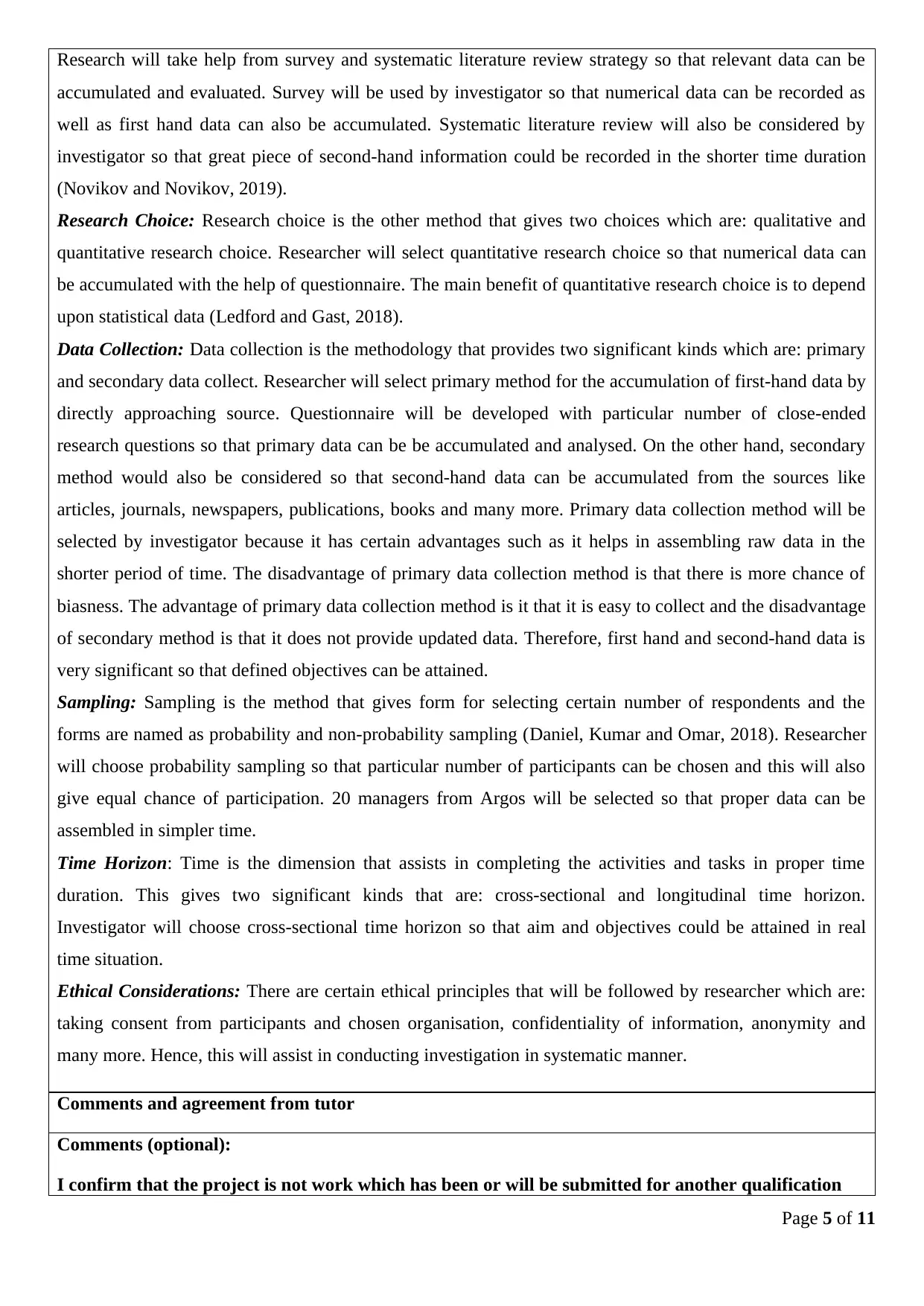
Research will take help from survey and systematic literature review strategy so that relevant data can be
accumulated and evaluated. Survey will be used by investigator so that numerical data can be recorded as
well as first hand data can also be accumulated. Systematic literature review will also be considered by
investigator so that great piece of second-hand information could be recorded in the shorter time duration
(Novikov and Novikov, 2019).
Research Choice: Research choice is the other method that gives two choices which are: qualitative and
quantitative research choice. Researcher will select quantitative research choice so that numerical data can
be accumulated with the help of questionnaire. The main benefit of quantitative research choice is to depend
upon statistical data (Ledford and Gast, 2018).
Data Collection: Data collection is the methodology that provides two significant kinds which are: primary
and secondary data collect. Researcher will select primary method for the accumulation of first-hand data by
directly approaching source. Questionnaire will be developed with particular number of close-ended
research questions so that primary data can be be accumulated and analysed. On the other hand, secondary
method would also be considered so that second-hand data can be accumulated from the sources like
articles, journals, newspapers, publications, books and many more. Primary data collection method will be
selected by investigator because it has certain advantages such as it helps in assembling raw data in the
shorter period of time. The disadvantage of primary data collection method is that there is more chance of
biasness. The advantage of primary data collection method is it that it is easy to collect and the disadvantage
of secondary method is that it does not provide updated data. Therefore, first hand and second-hand data is
very significant so that defined objectives can be attained.
Sampling: Sampling is the method that gives form for selecting certain number of respondents and the
forms are named as probability and non-probability sampling (Daniel, Kumar and Omar, 2018). Researcher
will choose probability sampling so that particular number of participants can be chosen and this will also
give equal chance of participation. 20 managers from Argos will be selected so that proper data can be
assembled in simpler time.
Time Horizon: Time is the dimension that assists in completing the activities and tasks in proper time
duration. This gives two significant kinds that are: cross-sectional and longitudinal time horizon.
Investigator will choose cross-sectional time horizon so that aim and objectives could be attained in real
time situation.
Ethical Considerations: There are certain ethical principles that will be followed by researcher which are:
taking consent from participants and chosen organisation, confidentiality of information, anonymity and
many more. Hence, this will assist in conducting investigation in systematic manner.
Comments and agreement from tutor
Comments (optional):
I confirm that the project is not work which has been or will be submitted for another qualification
Page 5 of 11
accumulated and evaluated. Survey will be used by investigator so that numerical data can be recorded as
well as first hand data can also be accumulated. Systematic literature review will also be considered by
investigator so that great piece of second-hand information could be recorded in the shorter time duration
(Novikov and Novikov, 2019).
Research Choice: Research choice is the other method that gives two choices which are: qualitative and
quantitative research choice. Researcher will select quantitative research choice so that numerical data can
be accumulated with the help of questionnaire. The main benefit of quantitative research choice is to depend
upon statistical data (Ledford and Gast, 2018).
Data Collection: Data collection is the methodology that provides two significant kinds which are: primary
and secondary data collect. Researcher will select primary method for the accumulation of first-hand data by
directly approaching source. Questionnaire will be developed with particular number of close-ended
research questions so that primary data can be be accumulated and analysed. On the other hand, secondary
method would also be considered so that second-hand data can be accumulated from the sources like
articles, journals, newspapers, publications, books and many more. Primary data collection method will be
selected by investigator because it has certain advantages such as it helps in assembling raw data in the
shorter period of time. The disadvantage of primary data collection method is that there is more chance of
biasness. The advantage of primary data collection method is it that it is easy to collect and the disadvantage
of secondary method is that it does not provide updated data. Therefore, first hand and second-hand data is
very significant so that defined objectives can be attained.
Sampling: Sampling is the method that gives form for selecting certain number of respondents and the
forms are named as probability and non-probability sampling (Daniel, Kumar and Omar, 2018). Researcher
will choose probability sampling so that particular number of participants can be chosen and this will also
give equal chance of participation. 20 managers from Argos will be selected so that proper data can be
assembled in simpler time.
Time Horizon: Time is the dimension that assists in completing the activities and tasks in proper time
duration. This gives two significant kinds that are: cross-sectional and longitudinal time horizon.
Investigator will choose cross-sectional time horizon so that aim and objectives could be attained in real
time situation.
Ethical Considerations: There are certain ethical principles that will be followed by researcher which are:
taking consent from participants and chosen organisation, confidentiality of information, anonymity and
many more. Hence, this will assist in conducting investigation in systematic manner.
Comments and agreement from tutor
Comments (optional):
I confirm that the project is not work which has been or will be submitted for another qualification
Page 5 of 11
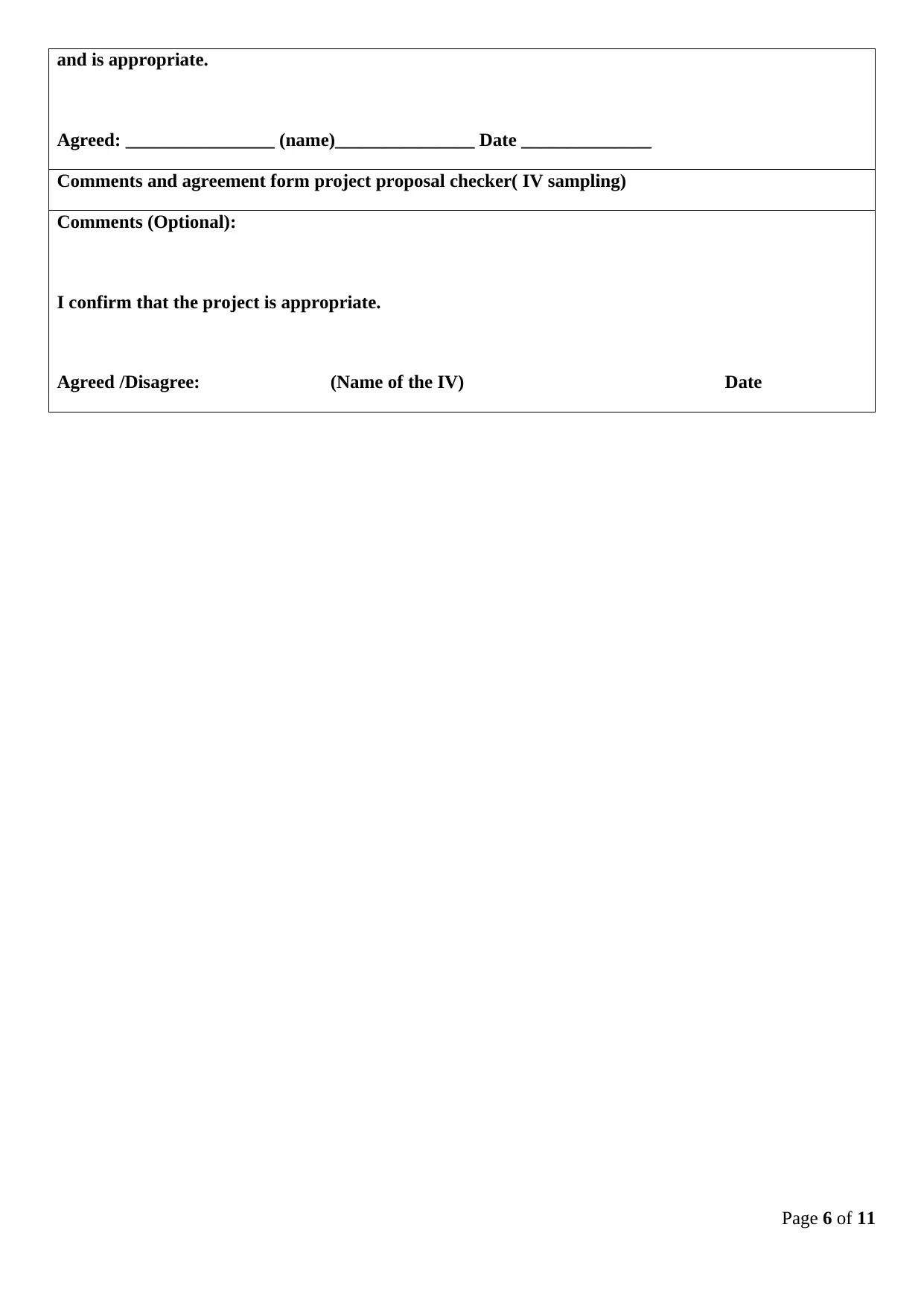
and is appropriate.
Agreed: ________________ (name)_______________ Date ______________
Comments and agreement form project proposal checker( IV sampling)
Comments (Optional):
I confirm that the project is appropriate.
Agreed /Disagree: (Name of the IV) Date
Page 6 of 11
Agreed: ________________ (name)_______________ Date ______________
Comments and agreement form project proposal checker( IV sampling)
Comments (Optional):
I confirm that the project is appropriate.
Agreed /Disagree: (Name of the IV) Date
Page 6 of 11
⊘ This is a preview!⊘
Do you want full access?
Subscribe today to unlock all pages.

Trusted by 1+ million students worldwide
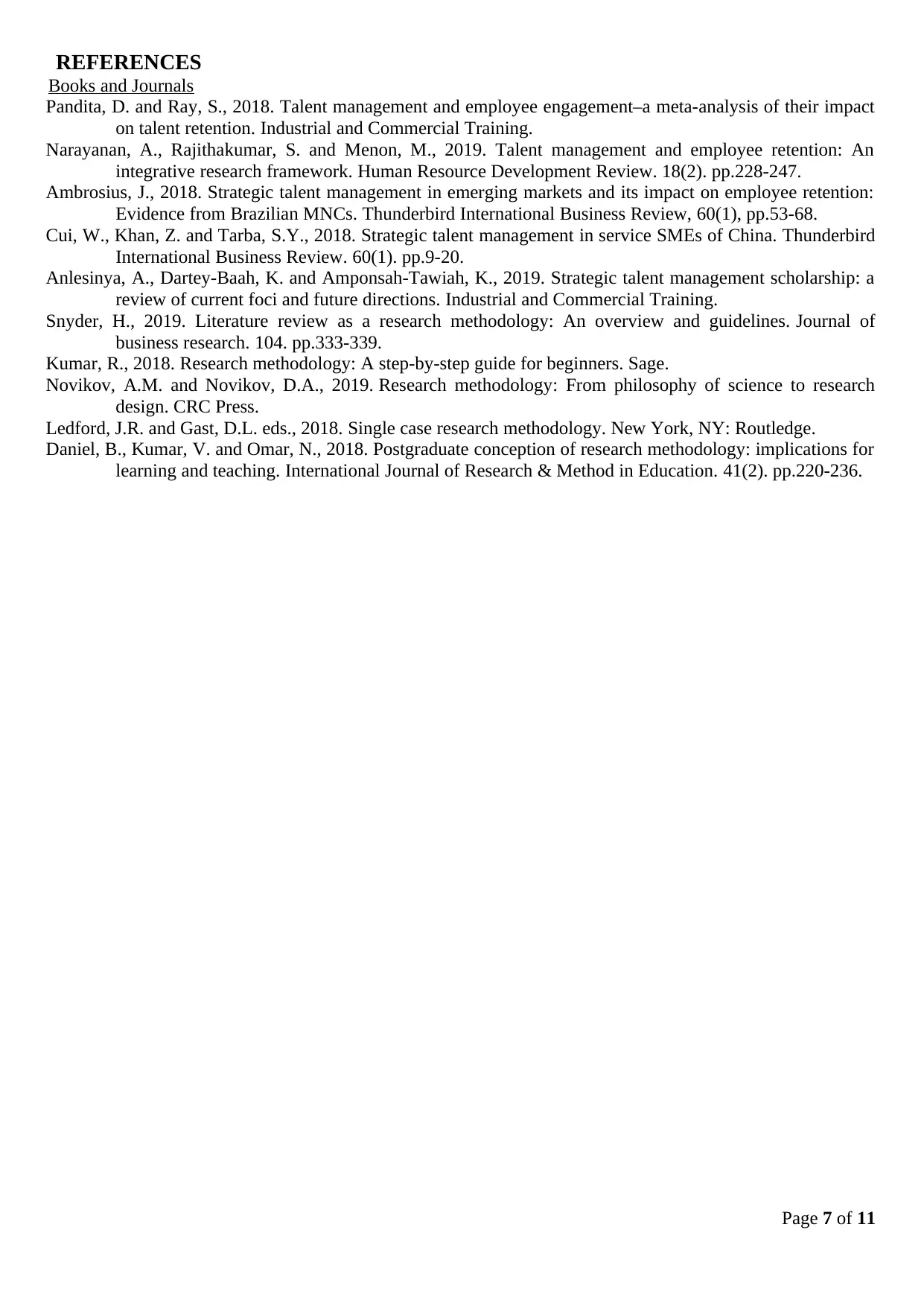
REFERENCES
Books and Journals
Pandita, D. and Ray, S., 2018. Talent management and employee engagement–a meta-analysis of their impact
on talent retention. Industrial and Commercial Training.
Narayanan, A., Rajithakumar, S. and Menon, M., 2019. Talent management and employee retention: An
integrative research framework. Human Resource Development Review. 18(2). pp.228-247.
Ambrosius, J., 2018. Strategic talent management in emerging markets and its impact on employee retention:
Evidence from Brazilian MNCs. Thunderbird International Business Review, 60(1), pp.53-68.
Cui, W., Khan, Z. and Tarba, S.Y., 2018. Strategic talent management in service SMEs of China. Thunderbird
International Business Review. 60(1). pp.9-20.
Anlesinya, A., Dartey-Baah, K. and Amponsah-Tawiah, K., 2019. Strategic talent management scholarship: a
review of current foci and future directions. Industrial and Commercial Training.
Snyder, H., 2019. Literature review as a research methodology: An overview and guidelines. Journal of
business research. 104. pp.333-339.
Kumar, R., 2018. Research methodology: A step-by-step guide for beginners. Sage.
Novikov, A.M. and Novikov, D.A., 2019. Research methodology: From philosophy of science to research
design. CRC Press.
Ledford, J.R. and Gast, D.L. eds., 2018. Single case research methodology. New York, NY: Routledge.
Daniel, B., Kumar, V. and Omar, N., 2018. Postgraduate conception of research methodology: implications for
learning and teaching. International Journal of Research & Method in Education. 41(2). pp.220-236.
Page 7 of 11
Books and Journals
Pandita, D. and Ray, S., 2018. Talent management and employee engagement–a meta-analysis of their impact
on talent retention. Industrial and Commercial Training.
Narayanan, A., Rajithakumar, S. and Menon, M., 2019. Talent management and employee retention: An
integrative research framework. Human Resource Development Review. 18(2). pp.228-247.
Ambrosius, J., 2018. Strategic talent management in emerging markets and its impact on employee retention:
Evidence from Brazilian MNCs. Thunderbird International Business Review, 60(1), pp.53-68.
Cui, W., Khan, Z. and Tarba, S.Y., 2018. Strategic talent management in service SMEs of China. Thunderbird
International Business Review. 60(1). pp.9-20.
Anlesinya, A., Dartey-Baah, K. and Amponsah-Tawiah, K., 2019. Strategic talent management scholarship: a
review of current foci and future directions. Industrial and Commercial Training.
Snyder, H., 2019. Literature review as a research methodology: An overview and guidelines. Journal of
business research. 104. pp.333-339.
Kumar, R., 2018. Research methodology: A step-by-step guide for beginners. Sage.
Novikov, A.M. and Novikov, D.A., 2019. Research methodology: From philosophy of science to research
design. CRC Press.
Ledford, J.R. and Gast, D.L. eds., 2018. Single case research methodology. New York, NY: Routledge.
Daniel, B., Kumar, V. and Omar, N., 2018. Postgraduate conception of research methodology: implications for
learning and teaching. International Journal of Research & Method in Education. 41(2). pp.220-236.
Page 7 of 11
Paraphrase This Document
Need a fresh take? Get an instant paraphrase of this document with our AI Paraphraser
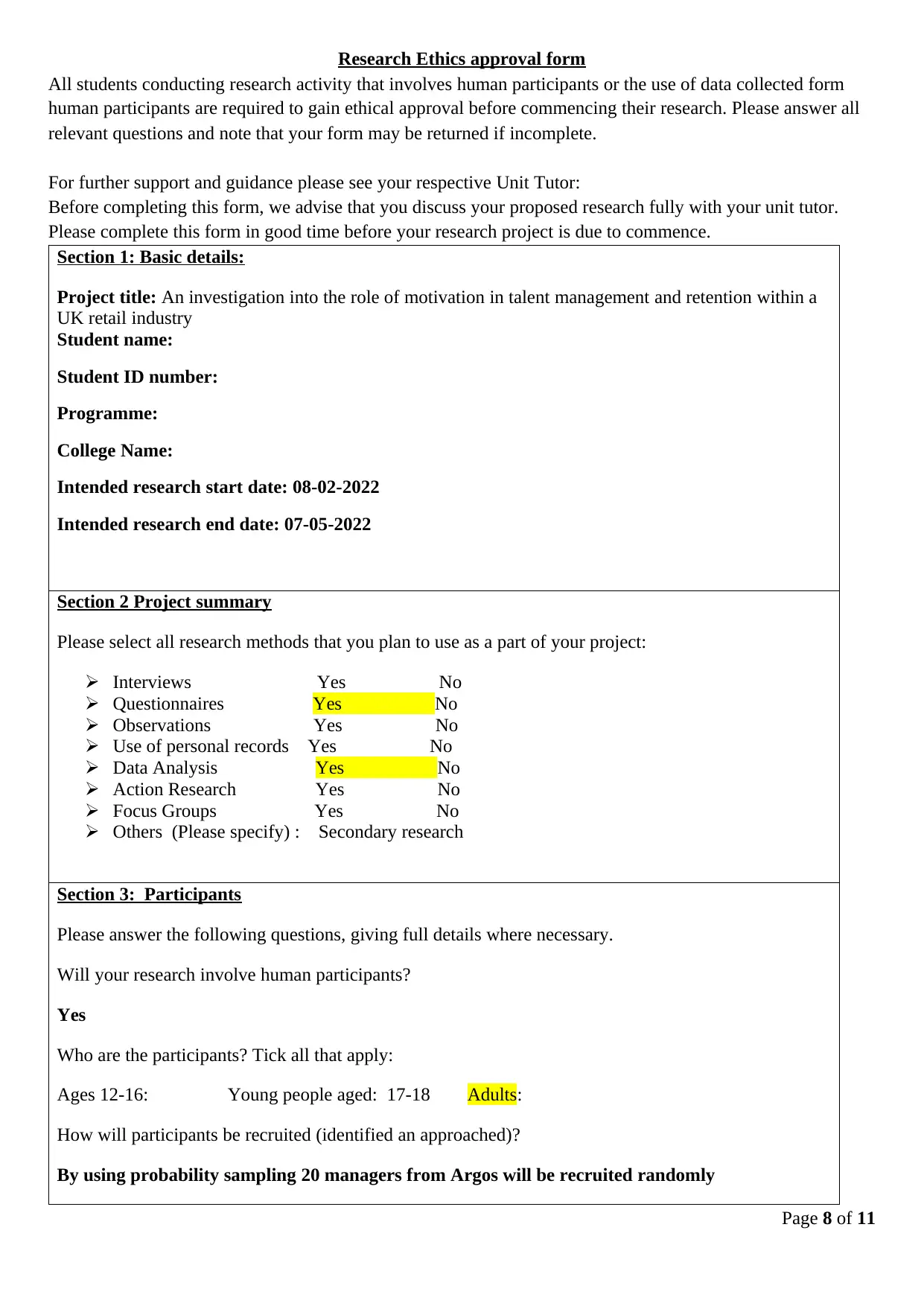
Research Ethics approval form
All students conducting research activity that involves human participants or the use of data collected form
human participants are required to gain ethical approval before commencing their research. Please answer all
relevant questions and note that your form may be returned if incomplete.
For further support and guidance please see your respective Unit Tutor:
Before completing this form, we advise that you discuss your proposed research fully with your unit tutor.
Please complete this form in good time before your research project is due to commence.
Section 1: Basic details:
Project title: An investigation into the role of motivation in talent management and retention within a
UK retail industry
Student name:
Student ID number:
Programme:
College Name:
Intended research start date: 08-02-2022
Intended research end date: 07-05-2022
Section 2 Project summary
Please select all research methods that you plan to use as a part of your project:
Interviews Yes No
Questionnaires Yes No
Observations Yes No
Use of personal records Yes No
Data Analysis Yes No
Action Research Yes No
Focus Groups Yes No
Others (Please specify) : Secondary research
Section 3: Participants
Please answer the following questions, giving full details where necessary.
Will your research involve human participants?
Yes
Who are the participants? Tick all that apply:
Ages 12-16: Young people aged: 17-18 Adults:
How will participants be recruited (identified an approached)?
By using probability sampling 20 managers from Argos will be recruited randomly
Page 8 of 11
All students conducting research activity that involves human participants or the use of data collected form
human participants are required to gain ethical approval before commencing their research. Please answer all
relevant questions and note that your form may be returned if incomplete.
For further support and guidance please see your respective Unit Tutor:
Before completing this form, we advise that you discuss your proposed research fully with your unit tutor.
Please complete this form in good time before your research project is due to commence.
Section 1: Basic details:
Project title: An investigation into the role of motivation in talent management and retention within a
UK retail industry
Student name:
Student ID number:
Programme:
College Name:
Intended research start date: 08-02-2022
Intended research end date: 07-05-2022
Section 2 Project summary
Please select all research methods that you plan to use as a part of your project:
Interviews Yes No
Questionnaires Yes No
Observations Yes No
Use of personal records Yes No
Data Analysis Yes No
Action Research Yes No
Focus Groups Yes No
Others (Please specify) : Secondary research
Section 3: Participants
Please answer the following questions, giving full details where necessary.
Will your research involve human participants?
Yes
Who are the participants? Tick all that apply:
Ages 12-16: Young people aged: 17-18 Adults:
How will participants be recruited (identified an approached)?
By using probability sampling 20 managers from Argos will be recruited randomly
Page 8 of 11
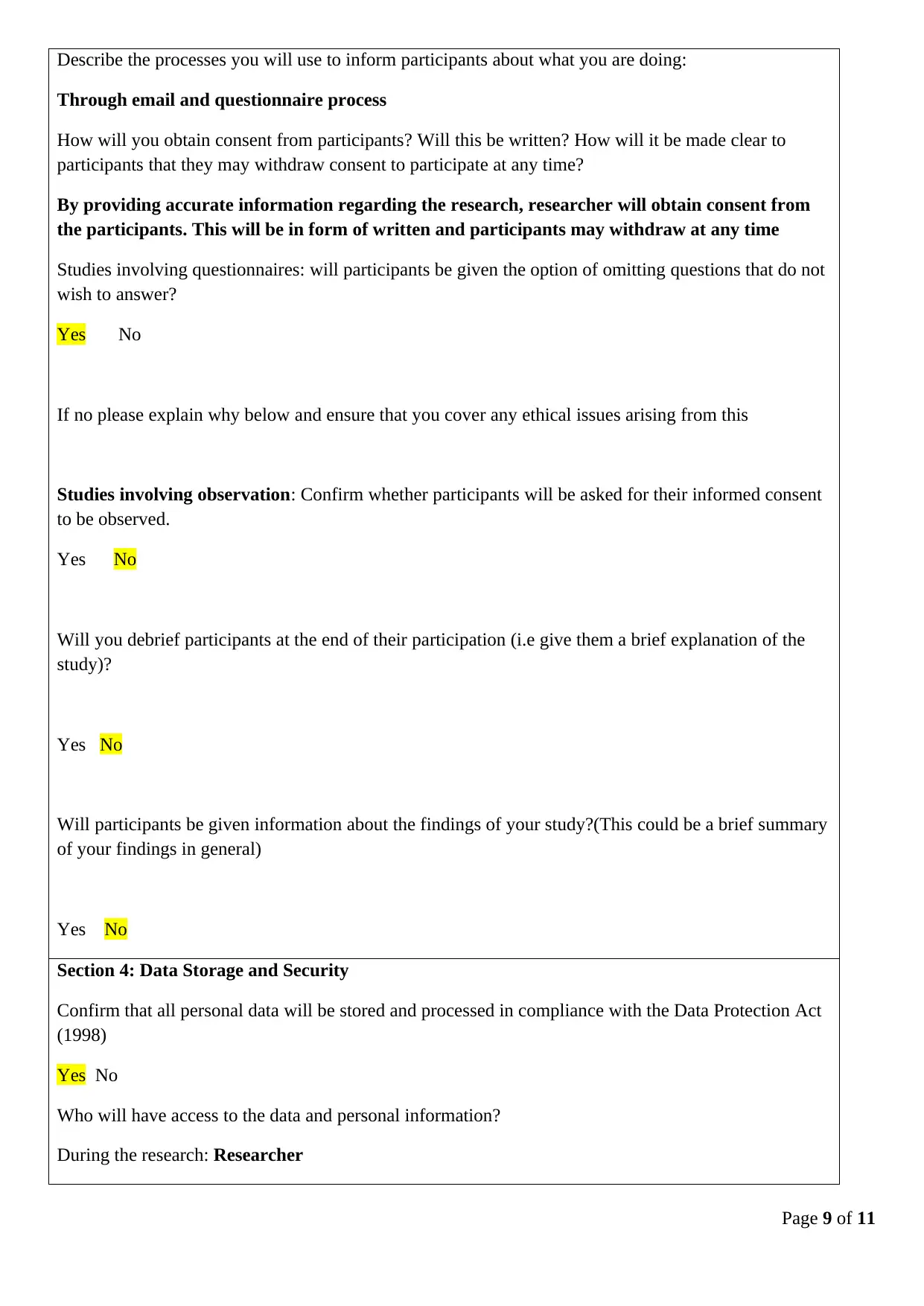
Describe the processes you will use to inform participants about what you are doing:
Through email and questionnaire process
How will you obtain consent from participants? Will this be written? How will it be made clear to
participants that they may withdraw consent to participate at any time?
By providing accurate information regarding the research, researcher will obtain consent from
the participants. This will be in form of written and participants may withdraw at any time
Studies involving questionnaires: will participants be given the option of omitting questions that do not
wish to answer?
Yes No
If no please explain why below and ensure that you cover any ethical issues arising from this
Studies involving observation: Confirm whether participants will be asked for their informed consent
to be observed.
Yes No
Will you debrief participants at the end of their participation (i.e give them a brief explanation of the
study)?
Yes No
Will participants be given information about the findings of your study?(This could be a brief summary
of your findings in general)
Yes No
Section 4: Data Storage and Security
Confirm that all personal data will be stored and processed in compliance with the Data Protection Act
(1998)
Yes No
Who will have access to the data and personal information?
During the research: Researcher
Page 9 of 11
Through email and questionnaire process
How will you obtain consent from participants? Will this be written? How will it be made clear to
participants that they may withdraw consent to participate at any time?
By providing accurate information regarding the research, researcher will obtain consent from
the participants. This will be in form of written and participants may withdraw at any time
Studies involving questionnaires: will participants be given the option of omitting questions that do not
wish to answer?
Yes No
If no please explain why below and ensure that you cover any ethical issues arising from this
Studies involving observation: Confirm whether participants will be asked for their informed consent
to be observed.
Yes No
Will you debrief participants at the end of their participation (i.e give them a brief explanation of the
study)?
Yes No
Will participants be given information about the findings of your study?(This could be a brief summary
of your findings in general)
Yes No
Section 4: Data Storage and Security
Confirm that all personal data will be stored and processed in compliance with the Data Protection Act
(1998)
Yes No
Who will have access to the data and personal information?
During the research: Researcher
Page 9 of 11
⊘ This is a preview!⊘
Do you want full access?
Subscribe today to unlock all pages.

Trusted by 1+ million students worldwide
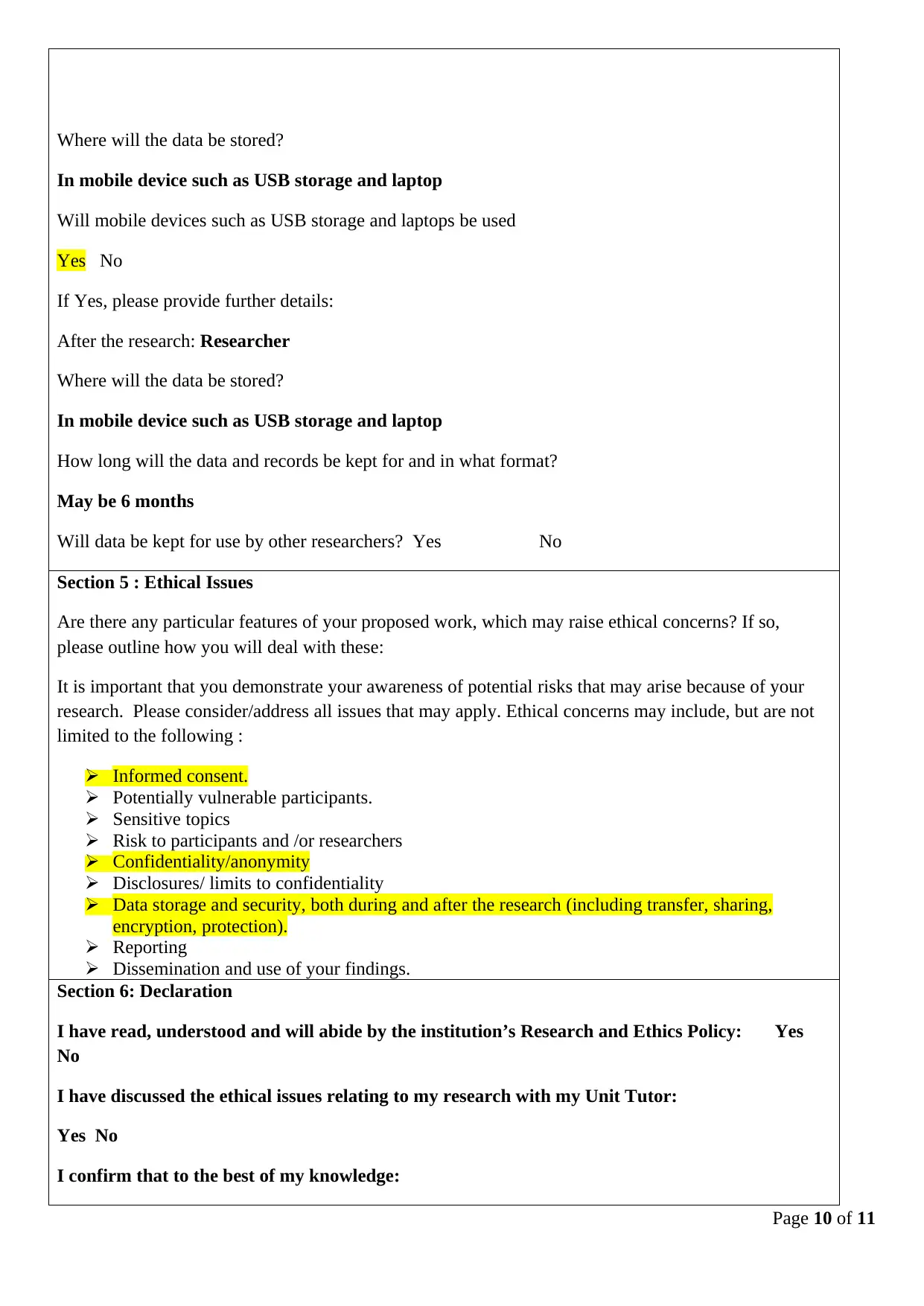
Where will the data be stored?
In mobile device such as USB storage and laptop
Will mobile devices such as USB storage and laptops be used
Yes No
If Yes, please provide further details:
After the research: Researcher
Where will the data be stored?
In mobile device such as USB storage and laptop
How long will the data and records be kept for and in what format?
May be 6 months
Will data be kept for use by other researchers? Yes No
Section 5 : Ethical Issues
Are there any particular features of your proposed work, which may raise ethical concerns? If so,
please outline how you will deal with these:
It is important that you demonstrate your awareness of potential risks that may arise because of your
research. Please consider/address all issues that may apply. Ethical concerns may include, but are not
limited to the following :
Informed consent.
Potentially vulnerable participants.
Sensitive topics
Risk to participants and /or researchers
Confidentiality/anonymity
Disclosures/ limits to confidentiality
Data storage and security, both during and after the research (including transfer, sharing,
encryption, protection).
Reporting
Dissemination and use of your findings.
Section 6: Declaration
I have read, understood and will abide by the institution’s Research and Ethics Policy: Yes
No
I have discussed the ethical issues relating to my research with my Unit Tutor:
Yes No
I confirm that to the best of my knowledge:
Page 10 of 11
In mobile device such as USB storage and laptop
Will mobile devices such as USB storage and laptops be used
Yes No
If Yes, please provide further details:
After the research: Researcher
Where will the data be stored?
In mobile device such as USB storage and laptop
How long will the data and records be kept for and in what format?
May be 6 months
Will data be kept for use by other researchers? Yes No
Section 5 : Ethical Issues
Are there any particular features of your proposed work, which may raise ethical concerns? If so,
please outline how you will deal with these:
It is important that you demonstrate your awareness of potential risks that may arise because of your
research. Please consider/address all issues that may apply. Ethical concerns may include, but are not
limited to the following :
Informed consent.
Potentially vulnerable participants.
Sensitive topics
Risk to participants and /or researchers
Confidentiality/anonymity
Disclosures/ limits to confidentiality
Data storage and security, both during and after the research (including transfer, sharing,
encryption, protection).
Reporting
Dissemination and use of your findings.
Section 6: Declaration
I have read, understood and will abide by the institution’s Research and Ethics Policy: Yes
No
I have discussed the ethical issues relating to my research with my Unit Tutor:
Yes No
I confirm that to the best of my knowledge:
Page 10 of 11
Paraphrase This Document
Need a fresh take? Get an instant paraphrase of this document with our AI Paraphraser
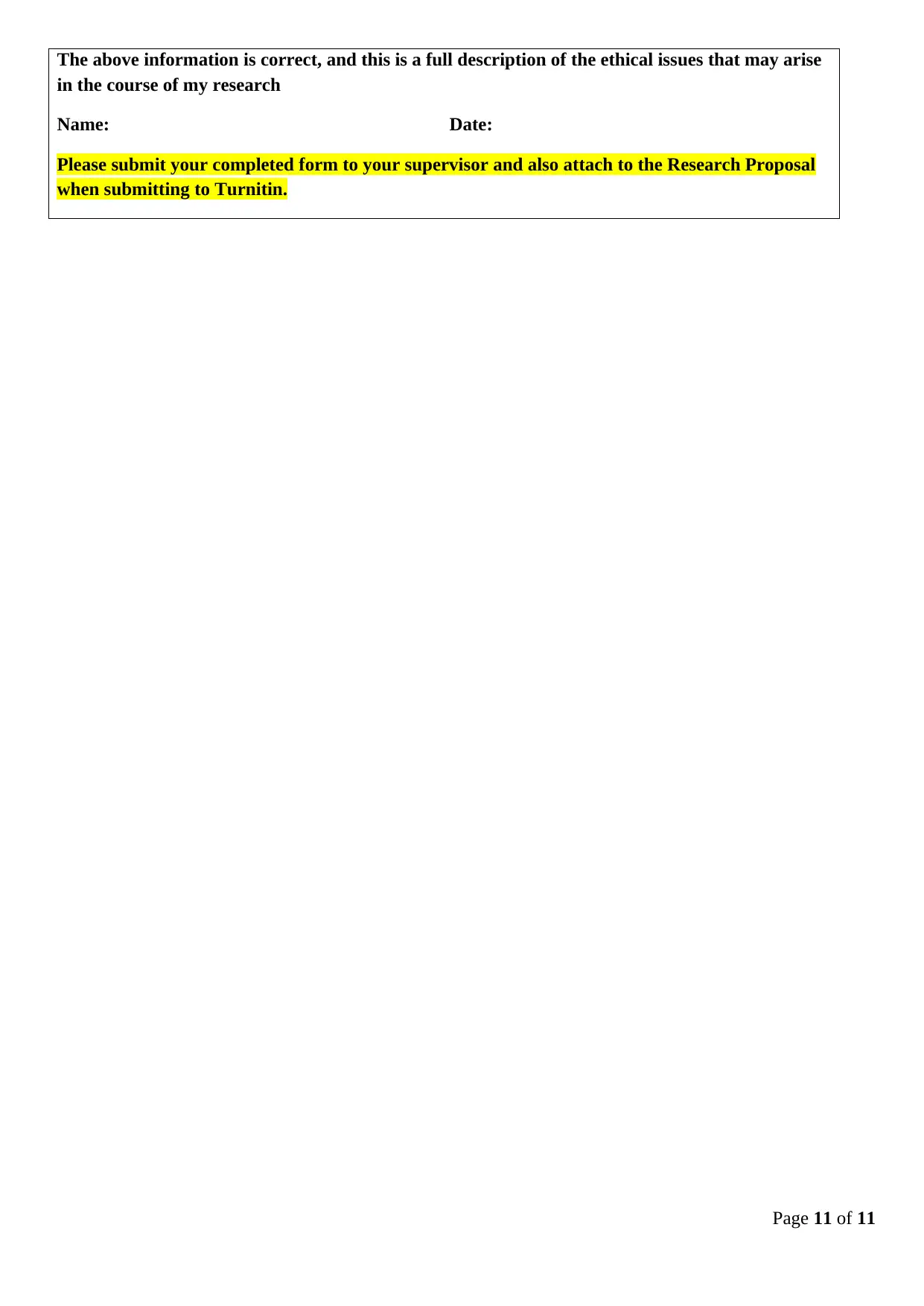
The above information is correct, and this is a full description of the ethical issues that may arise
in the course of my research
Name: Date:
Please submit your completed form to your supervisor and also attach to the Research Proposal
when submitting to Turnitin.
Page 11 of 11
in the course of my research
Name: Date:
Please submit your completed form to your supervisor and also attach to the Research Proposal
when submitting to Turnitin.
Page 11 of 11
1 out of 11
Related Documents
Your All-in-One AI-Powered Toolkit for Academic Success.
+13062052269
info@desklib.com
Available 24*7 on WhatsApp / Email
![[object Object]](/_next/static/media/star-bottom.7253800d.svg)
Unlock your academic potential
Copyright © 2020–2026 A2Z Services. All Rights Reserved. Developed and managed by ZUCOL.


